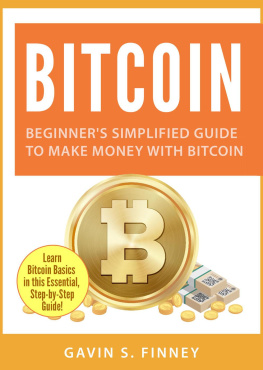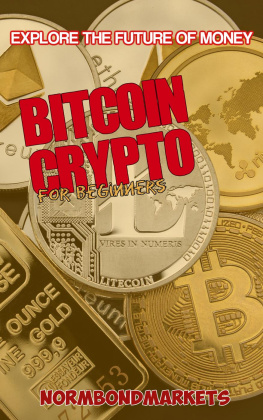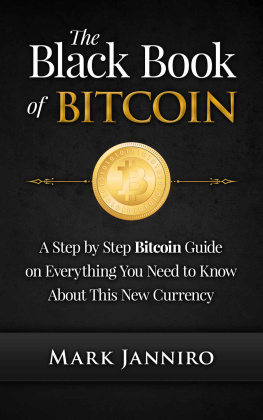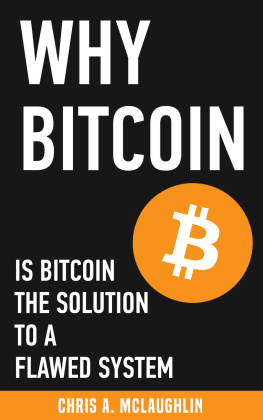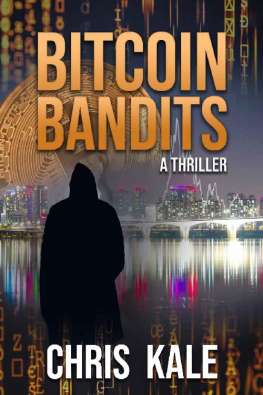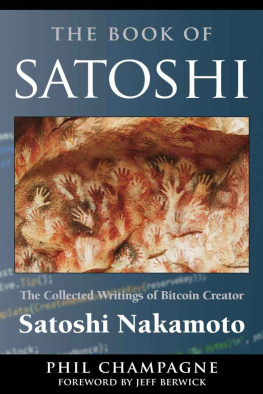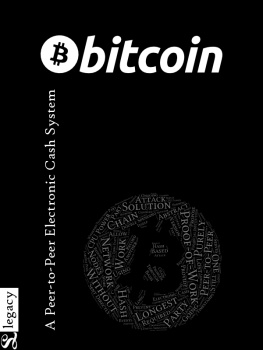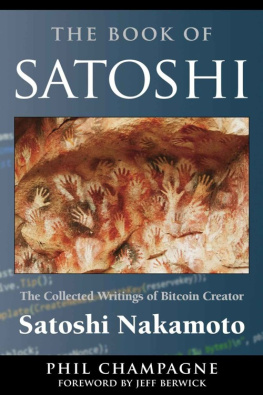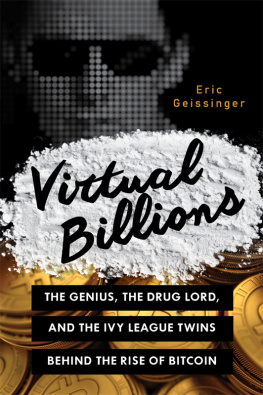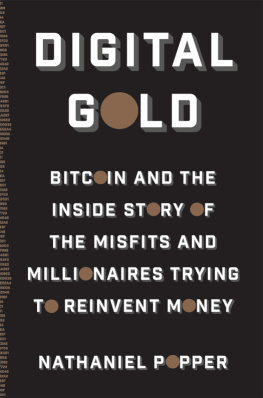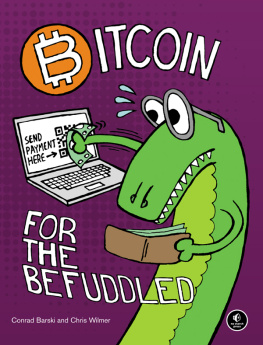PAY THE DEVIL IN BITCOIN
The Creation of a Cryptocurrency and How Half a Billion Dollars of It Vanished from Japan
JAKE ADELSTEIN AND NATHALIE STUCKY
Text copyright 2017 Jake Adelstein and Nathalie Stucky
All rights reserved.
No part of this book may be reproduced, or stored in a retrieval system, or transmitted in any form or by any means, electronic, mechanical, photocopying, recording, or otherwise, without express written permission of the authors.
Cover design by Andrew Lee
Bitcoin image on cover by Thomas Trutschel/photothek image UG/Alamy Stock Photo
Contents
PREFACE
BY JAKE ADELSTEIN
Theres a saying in JapaneseJigoku no sata mo kane shidaimeaning Even at the gates of hell, what happens depends on how much money you have. The saying is the inspiration for the title of this book and illustrates something we all know is true: we are treated very differently according to how much wealth we have. It can be the difference between heaven or hell.
Some may ask, does hell really exist? Isnt that a matter of metaphysical belief?
Yes, it is. And in some ways, belief in heaven or hell is about as rational as belief in a cryptocurrency called bitcoin.
Bitcoin is not just a cryptocurrency; it is a financial force, and the faith placed in its power and probity by true believers is what gives it value. In that sense, it is almost magical.
There have been several excellent books written about bitcoin and a few good documentaries. This book is for people who are curious about this cryptocurrency and want to know more but dont need a 350-page tome on the subject.
Its also a book about bitcoin and Japan. The two are interlinked in many ways: the mysterious founder has a Japanese name, and the first major bitcoin exchange, Mt. Gox, was established in Tokyo. Japan is also home to one of bitcoins foremost missionaries, Roger Ver, jokingly referred to as the Bitcoin Jesus.
The Swiss journalist Nathalie Stucky and I have spent two years covering the rise and fall and rise again of bitcoin and the collapse of what was once the center of the bitcoin universe, Mt. Gox. Most of our articles covering the story were originally published in the Daily Beast, an American website focusing on politics, world affairs, and pop culture, which currently reaches more than twenty million readers per month. As time has gone by, we have become close to many of the people appearing in this book. Hopefully, this hasnt affected our judgment. Ms. Stucky in particular became very close to and very fond of Mark Karpels, the de facto creator of Mt. Gox, and the fondness appeared to be mutual. Im about as fond of Karpels as I am of his cats, but I do believe that he has been dealt an unfair hand.
The gods of fortune in Japan are very fickle, although apparently they will take bribes. Even if you bribe them with money or commodities, however, they dont always deliver.
One of the first things youre told as a journalist about the basics of investigative journalism is this: follow the money. If you follow the bitcoin, you are likely to encounter a strange alternate world populated by shady characters, drug dealers, diligent special agents, corrupt cops, hapless coders, and pirate hackers. Its a fun world to explore.
Bitcoin doesnt exist in solid form like most fiat money. Its shapeless, immaterial, usually traded over the Internet. Yet it wasnt created out of nothingthe currency rests on complicated computer programming, a public ledger, a dedicated group of usersand it is given value by scarcity, trust, and above all human greed.
And as long as the human race is greedy, I dont think well see bitcoin vanish from our world. The currency may be new, but the raw desire behind it has been around for ages.
You can pay the devil in bitcoin. And since 2013, at least one church in New York City accepts donations in bitcoin as well.
A NOTE ON SOURCES
This book was written with the cooperation of former Mt. Gox employees, including CEO Mark Karpels. Its creation involved extensive interviews with lawyers, journalists, police officers, and even people inside the prosecutors office, who went above and beyond the call of duty and sometimes against their own self-interests to share with us details of what they knew. We have added citations for those who would like to know more, but we have not given dates for each and every interview we conducted. Suffice it to say that when quotations are given without sources, they come from real conversations we had with our informants.
The people we spoke with told us, in great detail, about the Mt. Gox case and related criminal cases, some of which are still ongoing. Some sources provided documents. In doing so, they took incredible risks. Some of them violated NDAs or rules set up by their organizations that forbade them from speaking to the press without permission, and, possibly, in speaking to us they broke the law. If they were caught cooperating with us or if the full contents of what they disclosed were to become public, they could face not only the loss of their jobs but prosecution for violations of Japans civil-servants law (for disclosure of information gained in capacity as a public official) or even retaliation from the firms that employ them.
Therefore, in order to protect sources, we have changed some names and obscured certain details. Bitcoin is a virtual currency, but our sources are real people. We would like to ensure their well-being, at least, and to thank here those who cant be namedthank you!
CHAPTER ONE
BITCOIN AND ITS MYSTERIOUS FOUNDER
We use money every day, and we never stop to think about it. While we may be moving toward a cashless society, we still carry around wallets containing one-dollar bills with the face of George Washington on them, or hundred-yen coins engraved with cherry blossoms, and we expect the value of what were carrying to remain fairly constant. Currency traders make money on guessing when my hundred-yen coin is going to be worth less or more than a dollar bill.
At this point in time, the rate is about one hundred yen to the dollar. It makes calculating things easy. But that wont last for long.
The US dollar is still the gold standard of world currency, but the value of a currency can fluctuate tremendously, and it often depends on the way governments manipulate the market or on external political factors that cant be controlled.
When the result of the Brexit vote was Britain deciding to leave the EU, the euro and the pound plummeted. That was not a planned move.
In Japan, Prime Minister Shinzo Abes economic plan, dubbed Abenomics, drove down the value of the yen for an extended period of time.
For centuries, almost every currency in the world has been issued by governments, which have considerable power to affect its value and even regulate its supply.
And then along came bitcoin (BTC) in 2008. Its not backed by any government. There is no Royal Bank of Bitcoin. Yet increasingly it has been accepted as a valid form of payment.
What is bitcoin? A dummy currency printed on poker chips? A Ponzi scheme? The wet dream of criminal enterprises?
No. Bitcoin is the name of a digital cryptocurrency created by a volunteer network of computer users. It is held electronically. It aims to be a secure method of buying items and sending money without the transaction fees of services like PayPal. If you dont want to spend forty dollars transferring a small amount of money out of Japan to the United States, use bitcoin instead. To buy it or sell it, all you need to do is set up an online account. On coinbase.com, this can be done in a matter of minutes. You can use other online exchanges to buy it with your credit card, or you can buy it from someone with hard cash. You can even use free bitcoin software to set up your own virtual wallet to receive money by logging into blockchain.info.
Next page


